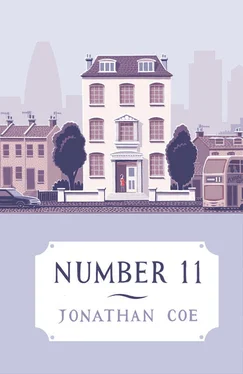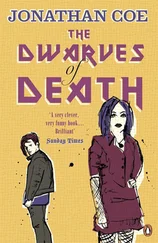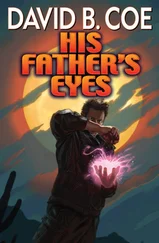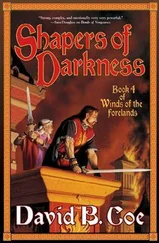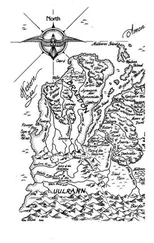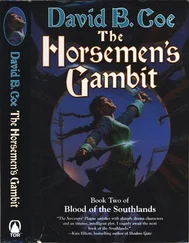Laura told me, as well, that it was very important to be organized when you write. That you should start at the beginning and tell everything in sequence. Just as she did, I suppose, when she told me the story of her husband and the Crystal Garden. But so far, I don’t seem to be following her advice very well.
All right, then. I shall put an end to this rambling, and attempt to set down the story of another visit to Beverley to stay with my grandparents, in the summer of 2003. A visit I made not with my brother this time but with Alison, my dear friend Alison, who at last after so many years’ mysterious distance I have found again, picking up the threads of our precious friendship. This is our story, really, the story of how we first became close, before strange — not to say ridiculous — forces intervened and drove us apart. And it’s also the story of –
But no, I mustn’t say too much just yet. Let’s go back to the very beginning.
The body of Dr David Kelly, the United Nations weapons inspector, was discovered by Oxfordshire police at 8.30 on the morning of Friday 18 July 2003. The body was found in the woodland on Harrowdown Hill, less than a mile north of the village of Longworth, in a spot accessible only on foot, where Dr Kelly had sometimes been known to take his afternoon walks. A verdict of death by suicide was quickly announced by the authorities.
His death was a matter of huge public interest. In preparation for Britain’s supporting role in the US invasion of Iraq, Tony Blair had been trying to persuade the British people that Saddam Hussein’s regime presented a significant threat to British security. A government dossier had been prepared which included the claim that Saddam Hussein possessed weapons of mass destruction, and that these could be targeted at the UK within a timeframe of forty-five minutes. After an interview with Dr Kelly, a BBC journalist had broadcast a report suggesting that this claim was unrealistic, and that the dossier itself had been ‘sexed up’ in order to bolster the case for war. The widespread belief that the source of this report was Britain’s leading international weapons inspector suddenly made Dr Kelly a controversial and politically inconvenient figure.
I don’t really know why I think so often about David Kelly’s death. I can only suppose it’s because, at the age of ten, it was the first national news story that made any impression on me at all. Maybe, too, because it evoked such a strong and chilling image: the loneliness of his death, the body discovered so many hours later in that remote woodland, silent and unvisited. Or maybe because of the way Gran and Grandad reacted: the way they made it clear that this was not an ordinary death, that it would have consequences, send ripples of unease and mistrust throughout the country. That Britain would be a different place from now on: unquiet, haunted.
The first I heard of it was on the six o’clock news, the day that Alison and I arrived in Beverley. We’d not been there long. Grandad had driven over to pick us up from Leeds and we’d both said rather teary-eyed, apprehensive farewells to our mothers, who would be heading off to catch a plane together that evening. On arriving back at my grandparents’ house, Alison and I had gone upstairs to the bedroom in which I’d stayed so many times before, sometimes alone, sometimes with my brother. Unpacking took only about two minutes; then Alison went out into the garden, and soon afterwards I went downstairs to follow her but I must have looked into the living room first to ask Gran and Grandad something, and that was when I got waylaid by the news. They were both totally absorbed by the television, and normally when I saw grown-ups like that I would just have left them to it, but this time there was something about the news item they were watching that drew me in. I stepped further into the living room and sat down on the sofa next to Gran, who barely seemed to notice that I was there. On television the reporter was talking in a portentous voice over helicopter shots of a verdant and wooded patch of English countryside. On the screen and in the room, there was an atmosphere I had never encountered (or at least noticed) before: charged, expectant, filled with shock and apprehension. I sat in silence and watched, not really understanding any of it except for the fact that a man had died, a doctor who had lived in Oxfordshire and had something to do with Iraq and weapons and everyone was very upset and worried about it.
When the report was over, Grandad turned to Gran and said: ‘Well, that’s that, then, isn’t it? He’s got blood on his hands now.’
Gran didn’t comment. She rose to her feet — quite a slow, effortful process — and shuffled into the kitchen. I got up and followed her.
‘What does that mean?’ I asked.
She was reaching up into the cupboard, looking for tins of something.
‘What, lovey?’ she said, turning.
‘What Grandad said. Who was he talking about?’
She tutted and went back to her task. ‘Oh, you don’t want to take any notice of him. He’s always getting on his high horse.’
This was not exactly a satisfactory answer, but before I could ask her to be a bit clearer Grandad came hurrying into the kitchen, muttering words of reproach: ‘Now why didn’t you tell me you were getting tea ready? You know I’m supposed to be the one who does that. You’re not to let these girls tire you out.’
She rounded on him and said: ‘How many times do I have to tell you? I’m not feeling tired.’
‘I don’t care,’ said Grandad. ‘You should be taking things easy. Let me do it.’
I left them to their squabble and went to call Alison in from the garden, and then the four of us sat around the kitchen table eating sardines and tomatoes on toast. Grandad seemed moody and didn’t talk much. I was still thinking about the story on the news, the dead doctor who had been found sitting up against a tree in Oxfordshire, wherever that was. And Grandad’s remark about the other unknown man, the one who had got blood all over his hands. It was all very disturbing and mysterious. So that just left Gran and Alison talking together. Gran asked her what she wanted to do for the next week and Alison said she hadn’t really thought about it and she didn’t especially mind. ‘I hope you don’t find it too quiet here, that’s all,’ Gran said. ‘You’re not in the big city now, you know.’ By ‘the big city’ she meant Leeds, which she always seemed to imagine as a teeming metropolis, even though the part Alison and I lived in was not like that at all.
A few minutes later, when we were out in the garden together, Alison asked me, ‘So what are we going to do here for a week? No offence to your grandparents, but they seem a bit … old?’
‘I don’t know,’ I said, shrugging my shoulders. ‘We’ll find stuff. There’s a big moorland near here with woods and trees and stuff.’ Alison did not look impressed. ‘Ooh — and there’s a library.’
‘A library? Great. A week reading books.’
‘I bet they have CDs and stuff as well.’
Alison was making me cross. We were doing her a favour by inviting her here, after all. It wasn’t even as if she was one of my best schoolfriends.
‘What’s in that shed?’ she asked.
‘Let’s go and look.’
We spent a few minutes rummaging through the contents of Grandad’s little lean-to shed, but our pickings were slim. We found a cricket bat and a couple of very old tennis balls, and I was on the point of retrieving what we thought must be a skipping rope from one of the furthest corners when I saw something and gave a little scream and ran back out on to the lawn.
‘What’s the matter?’ she asked, joining me.
Читать дальше
